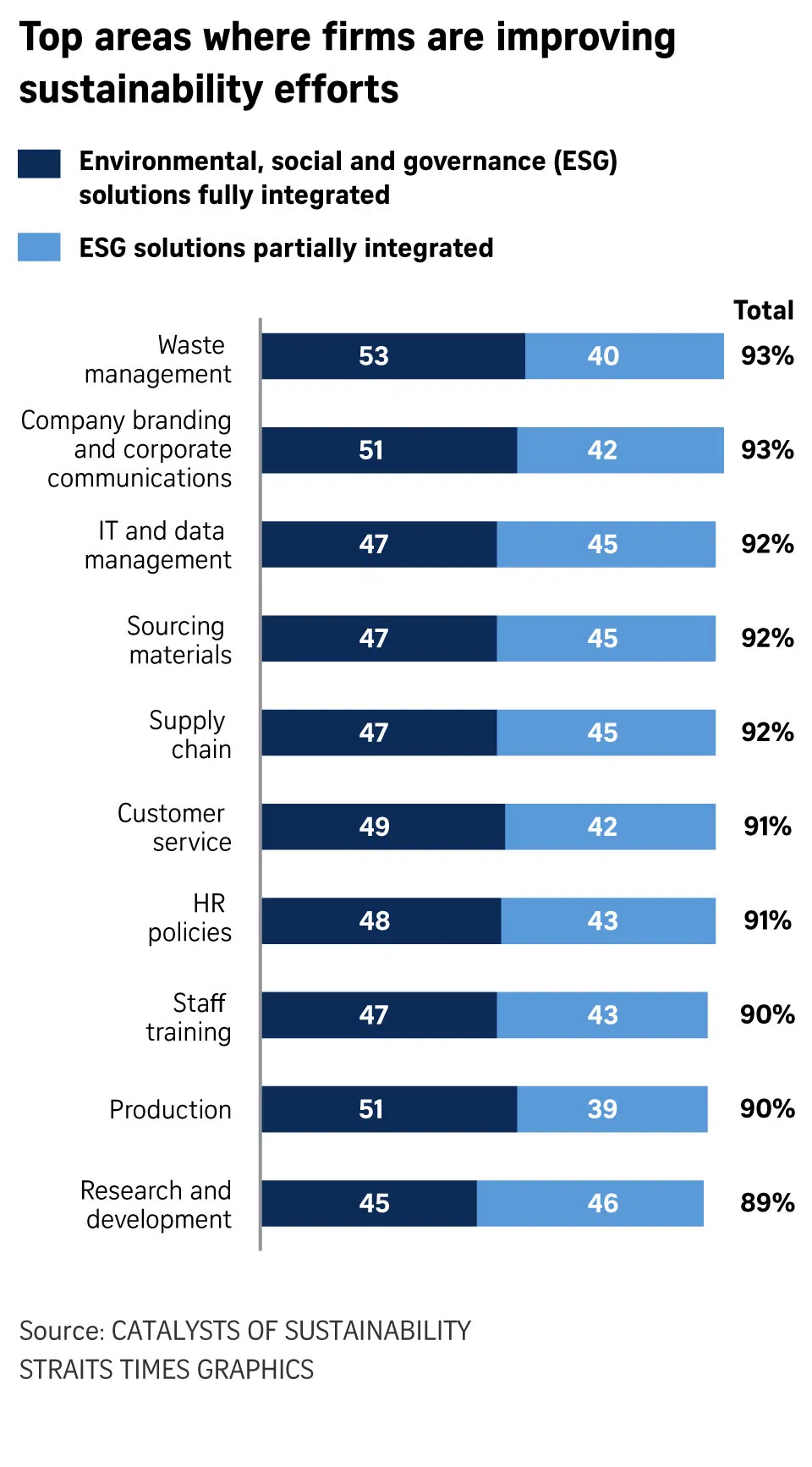Only 37% of SMEs surveyed have a clear road map on how to achieve their sustainability goals
Sign up now: Get ST's newsletters delivered to your inbox

Financial concerns and unclear reporting standards are hindering SMEs from being more sustainable.
ST PHOTO: ALPHONSUS CHERN
Follow topic:
SINGAPORE – Financial concerns and unclear reporting standards are common barriers that hinder efforts by small and medium-sized enterprises (SMEs) to be more sustainable, according to a study by DBS Bank.
The bank found that 83 per cent of small companies and 92 per cent of medium-sized firms have an environmental, social and governance (ESG) strategy in place or are creating one.
But only 37 per cent of these businesses have a clear road map on how to achieve their goals.
“With cash flow being especially critical for these smaller businesses, financial barriers were the most common. Over a third of SMEs pointed out challenges around return on investment, cost of deployment and meeting growth targets,” said DBS, South-east Asia’s largest lender.
Over 800 companies – mostly SMEs – across Singapore, Hong Kong, India, Indonesia, mainland China and Taiwan were studied by the bank last August in partnership with Bloomberg Media Studios.
The firms were from the real estate, mobility, power, agriculture, hospitality, and food and beverage industries.
DBS chief executive Piyush Gupta said: “When it comes to SMEs, we understand the many challenges they face transitioning to more sustainable business models. But given that they are the lifeblood of economies, it is imperative that SMEs successfully make the transition.”
DBS group chief sustainability officer Helge Muenkel said SMEs increasingly face pressure to turn “greener” as their supply chain ecosystem often includes large companies that have adopted, or are compelled to adopt, ESG strategies and standards.
Companies that were surveyed said environmental projects will take up the lion’s share of their sustainability investments.
Most of them added that environmental factors have the greatest impact on their industries, in areas such as waste management, climate change and carbon footprint.
DBS said that incidentally, environmental initiatives are also low-hanging fruits that firms can show to investors and other stakeholders. “Access to funding and know-how likewise makes focusing on the E (part of ESG) easier.”
But while environmental factors have the biggest impact at the industry level, governance is most likely to influence business decision-making.
Data security, privacy, as well as transparent decision-making and financial reporting are among the most common factors that nudge decisions in one direction or another, said the bank.

Its study also showed that SMEs prioritise initiatives to improve their bottom line, and those that can be immediately adopted.
But these moves might come at the expense of creating ESG frameworks and long-term strategies that take years to fulfil.
A Chinese real estate and construction company said it does not have sufficient resources to investigate and plan ESG initiatives for the next 10 years, with its boss noting: “We have our long-term mission but not strategies.”
Ms Yulanda Chung, head of sustainability for institutional banking at DBS, said SMEs can start by identifying significant ESG elements to focus on and evaluating whether these factors could improve their bottom line.
“For example, an energy-intensive SME could reduce energy costs by using energy-efficient equipment to support decarbonisation. Meanwhile, a labour-intensive SME could consider focusing on the social aspect, and improve the health and safety, or diversity, inclusion and equality of its workforce.”
It is also important to analyse industry trends and best practices at an early stage, she added.
This helps firms gauge risks and understand the consequences of failing to align themselves with standards and guidelines.
“These exercises can also help them identify opportunities and begin to plan a course of action. Over time, they can turn this into a time-bound, actionable and quantifiable roadmap,” said Ms Chung.
SMEs also face a lack of clarity on ESG standards, according to the study. It showed that a third of firms find it tough to get ESG specialists on board, and nearly a third struggle with unclear reporting standards.
This makes it difficult for them to implement projects and measure progress, as well as demonstrate success to stakeholders and investors, said DBS.
Key performance indicators (KPIs) that are simplified and standardised will go a long way towards helping SMEs determine their environmental and social impact, along with metrics based on a company’s specific capabilities and profile, said DBS.
It noted: “Assessing them by the same criteria as larger companies that have more resources will make it difficult for SMEs to achieve their KPIs.”


